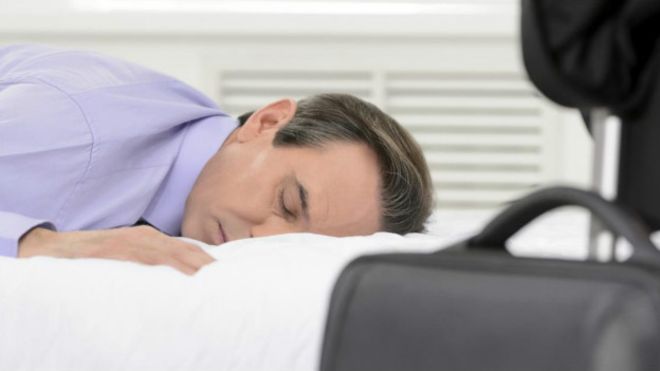揭秘成功 CEO 的睡眠情况
BBC布莱恩·波尔齐科夫斯基 (Bryan Borzykowski)(2023年9月2日)

成功的高管们在睡眠上经常“浅尝辄止”(图片来源:Thinkstock)
对于格雷戈里·麦基 (Gregory McKee) 而言,夜晚酣眠一场与合理饮食、经常锻炼同样重要。 如果没有八小时的睡眠时间,这位 STS Capital Partners 集团(总部位于加州的拉贺亚市)的创始人兼总经理,在第二天就会变得萎靡不振。
不久之前,因为开会的缘故,麦基搭乘了一架通宵航班,横跨全国。 他几乎一夜未眠。 下午三点左右他已经无法坚持,开始不停地出门喝咖啡、灌苏打水。 当晚他想要回顾之前一夜不寐换来的笔记成果时,却一个字看不懂。
“那些笔记毫无作用。”麦基说道。这位 CEO 名下的国际投资银行企业主要专注于公司兼并、剥离和策略业务。
与之相反的是,达伦·威特莫 (Darren Witmer) 却不敢奢望八小时的睡眠时间。 他每天凌晨三点上床,四个小时后便会醒来。 但这位重置产业 (Reset My Business) 商务咨询公司(总部位于北卡罗来纳州卡里市)的首席执行官却坚称,自己在第二天仍旧生龙活虎。他毫不困倦,也不用大量饮用咖啡,甚至在一天结束时,也照样能看懂自己之前的笔记,毫无困难。
他也坦诚:“感觉是有点奇怪, 身为生理学家的妻子也一直有意关注着我的不同寻常。”
对于一些忙碌的专业人士而言,究竟要睡多长时间的问题让他们感到很纠结。 尽管研究结果倡导整夜酣眠 — 即每晚睡七至九小时的理想状态 — 但许多人为了多工作一些时间,会选择放弃几个小时的睡眠时间,而不会缩短陪伴家人和满足个人兴趣的时间。
谈及此处,我们总忽略不了玛莎·斯图尔特 (Martha Stewart) 和唐纳德·特朗普 (Donald Trump) 等成功商人给人留下的印象,这些人总是对外宣称自己每晚只睡三、四个小时。 潜台词是说: 不大量减少睡眠时间,你就不可能大有作为。
那么对你的事业而言,睡得多和睡得少,究竟哪个更好?
宾夕法尼亚大学心理学教授、美国权威睡眠研究员大卫·丁格斯 (David Dinges) 认为,无论身在何处,大多数人都需要八个小时左右的睡眠才能保证将自己的能力发挥到最好。 世界上只有不到 5% 的人是天生的短睡者,也就是说他们生物钟的节律就是每天晚上睡四到五小时。 但也有很多人刻意减少睡眠,然后在第二天还感觉不错。
隐性影响
虽说如此,但对于大多数人来说,夜里睡不好觉的情况都会对白天产生影响。 明尼苏达州罗彻斯特市梅约诊所的睡眠医学联执主任艾瑞克·奥尔森 (Eric Olson) 表示,如果人们连续超过一两天的睡眠时间都少于七、八个小时,那么他们的注意力、敏捷度和警惕性都会受到影响。 睡眠时间太短的人还可能很难记住细节信息,并且更容易遭受到诸如肥胖症甚至早逝等多种健康问题。
此外,许多睡眠较少的人都把节省出来时间用在工作上,但那却并非是高产时段。 威特莫也承认,一般在晚上九点到凌晨两点这八小时的工作时间里,他的效率并不像上午八点到下午五点那么好。他说:“凌晨两点,并不是我工作效率最好时间, 但 50% 的效率也总好过一无所有。”
许多睡眠较少的人甚至还相信,他们花在工作上的额外时间就是让事业不断攀升的关键。 那么,唐纳德·特朗普成功的秘诀真的就是每晚只睡三四个小时吗? 丁格斯表示,事实很可能并非如此。
他说,特朗普家族之所以能够保持高产,是因为他们不必为教育费用、退休积蓄等日常琐事而发愁。 有权有势的高管们和其他富人常会安排专门的团队来负责他们的日常生活琐事,比如洗衣服、支付各种账单、带孩子等等。 这就保证了他们在每天的最佳工作时间里没有琐事干扰,可以一心一意专注于让他们获得成功的事业。
小睡补觉
按照丁格斯的说法,即便是那些吹嘘自己夜夜好眠的人 — 或者几乎不需要酣眠的人 — 也可能会错算他们究竟睡了多长时间。 睡眠较少的人常常通过补觉来避免疲惫 — 比如说,许多人会在周末睡得久一点。 忙碌的高管可能会在搭乘长途飞机或乘车开会的途中休息。 丁格斯表示:“他们经常小睡。”
威特莫每月都要有几次九小时的睡眠。 另一位四小时睡眠者劳耶·理查德·鲍勃霍兹 (Lawyer Richard Bobholz) 则会在每天下午小睡 45 分钟。 鲍勃霍兹说:“午休醒来后,我便可以重振旗鼓、继续工作。”
研究还发现一般正常睡眠的人都会高估自己的睡眠时间。 丁格斯说,相比于报上来的八个小时,他们可能只睡了六个半小时。
奥尔森表示,理想的睡眠时间基本上是八个小时,这主要是出自追求良好健康状态的考虑。 他说:对于那些睡眠严重不足八小时的人来说,继续保持这样的状况可能有点蠢,因为睡眠太少确实会影响到产出,即使第二天你可能感觉还不错。
对于那些只有四小时睡眠的人,奥尔森也表示:“这些人可能很忙,但却并未真正发挥出自身的效率。”
(责编:跃生)
Successful executives and the four-hour sleep myth
Two months ago, McKee took an overnight flight across the country for a meeting. He barely slept. By mid-afternoon he was disengaged and he kept leaving the room to get more coffee and soda. He couldn’t make out a word of his sleep-deprived notes when he reviewed them later that night.
“They were useless,” said McKee, whose international investment banking specialises in mergers, divestitures and strategy.
On the flipside, Darren Witmer can’t imagine sleeping for eight hours. He goes to bed at about 3:00 and wakes up four hours later. The chief executive officer of Cary, North Carolina-based business consultancy Reset My Business swears he’s perfectly fine the next day. No drowsiness, no excessive coffee drinking, and no problem reading his notes at the end of the day.
“It’s a little weird,” he admitted. “My wife’s a physiologist and she’s been watching with intrigue.”
Exactly how much to sleep is a question many busy professionals struggle with. Despite research studies exalting the value of a full night’s sleep — ideally between seven and nine hours each night — many people eschew a few hours of sleep in favour of extra time to work, rather than taking that time from family and personal interests.
And it’s hard to ignore images of successful businesspeople like Martha Stewart and Donald Trump, who boast that they sleep only three or four hours a night. The implication: big success can’t really be achieved unless you give up sleep — and lots of it.
So is less sleep, or more, better for your career?
Most people, no matter where they live in the world, need about eight hours of sleep to perform at the best of their abilities, said David Dinges, a professor of psychology at the University of Pennsylvania and a leading sleep researcher in America. Less than 5% of the world population are naturally short sleepers, meaning that their body clocks simply operate on a shorter sleep cycle of four or five hours per night. Still, many people sleep less on purpose and may feel fine the next day.
Hidden impacts
For most people, though, missing out on a good night’s rest has an impact in the morning. Eric Olson, the co-director of sleep medicine at the Mayo Clinic in Rochester, Minnesota, says that attention, dexterity and vigilance to details can suffer when people sleep less than seven or eight hours for more than a day or two in a row. Too-short sleepers may also have trouble remembering details and find themselves susceptible to numerous health issues, including obesity and even premature death.
What’s more, many short sleepers use the extra awake time to work, but it isn’t always prime productivity time. Witmer admits that his late night hours — he often works between 21:00 and 2:00 — aren’t as productive as when he works between 8:00 and 17:00. “I’m not at my peak performance at 2 a.m.,” he said. “But even 50% productivity is better than nothing.”
Still, many short-sleepers believe the amount of time they spend working at something is the key to getting ahead. So, is the fact that Donald Trump sleeps three or four hours a night really behind his successes? Probably not, Dinges said.
The Trumps of the world are often more productive because they don’t have to worry about every day issues like paying for education or saving for retirement, he said. High-powered executives and other wealthy people also typically have teams of people taking care of mundane life tasks like laundry, paying bills and shuttling children to activities. That frees them up during the most productive hours of the day to focus on the work that makes them successful.
Snacking on sleep
Even people who boast of never missing a full night’s sleep — or barely needing any — may be miscalculating exactly how much rest they really get, according to Dinges. People who sleep less often avoid exhaustion by making up some of those hours — many sleep longer on the weekend, for instance. Busy executives may rest on long plane rides or while being driven in a car to a meeting.
“They snack on sleep,” Dinges said.
Witmer sleeps for a nine-hour stretch several times a month. Lawyer Richard Bobholz, another four-hour sleeper, often takes 45-minute naps in the afternoon. “When I wake up I’m ready to go again,” Bobholz said.
Research also shows that the average typical sleeper overestimates the number of hours of they sleep. Dinges says they’re likely in bed for closer to six-and-a-half hours, rather than the eight they report.
Ultimately, getting eight hours of sleep is ideal, mostly from the perspective of better health, Olson said. For those who sleep far fewer hours, there may be a bit of foolery going on, he said, because too little sleep — even if you feel just fine the next day — usually saps productivity.
“These people may be busy,” said Olson about the four-hour sleeper, “but they’re not being as efficient as they should be.”